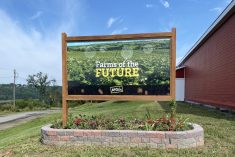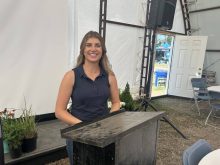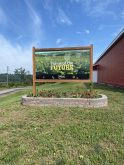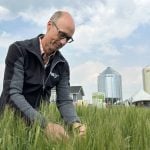A Vancouver ag tech firm is pitching a proposal to both public- and private-sector investors that would use Microsoft technology to help the ag sector “pull carbon from the air.”
Terramera on Monday put forward a $730 million proposal for an initiative it calls the Global Centre for Regenerative Agriculture, which would oversee efforts to help Canadian farms and ranches reduce atmospheric carbon, by “incentivizing regenerative farming practices.”
Terramera said its Global Centre would enable Canadian farms and ranches to pull 78 gigatonnes of carbon dioxide equivalent out of the atmosphere by 2050, stimulate 2.5 million new jobs and generate over $8.7 trillion in new economic activity “over the coming decades.”
Read Also

Alberta Crop Report: Rains in the south, dryness in the north
Rain fell onto the southern half of Alberta last week, while hot and dry conditions persisted in the northern half, according to the province’s crop report released on July 18.
The company said its $730 million plan would combine private investment “along with applications for federal and provincial support” to build and scale the technology needed.
The technology proposed would “reliably quantify” soil carbon sequestration and compensate farmers by establishing a sustainable carbon credit market, the company said.
The funding needed would go to create “the world’s largest regenerative agriculture initiative, building multi-purpose facilities including labs, greenhouses, offices and classrooms in British Columbia and integrate field testing sites across Canada.”
Assuming funding goals are met, Terramera said its plan is “shovel-ready and ready to staff in 2021, with sensing studies and facility construction extending through 2025.”
Terramera is no stranger to public-private partnerships, having spearheaded a $6.9 million project which earlier this year scored support from Canada’s Digital Technology Supercluster. Privately held Terramera, which formed in 2010, was one of the founding members of the digital supercluster.
Its supercluster project aims to use computational biochemistry, genomics, machine learning and robotics to develop new pest and pathogen controls, reducing the use of synthetics and improving the efficacy of so-called “natural” alternatives.
In the Global Centre proposal, software giant Microsoft is expected to play a “central” role, providing Microsoft Azure storage and computing services for Terramera’s proposed artificial intelligence (AI) and machine learning (ML) platforms.
Microsoft FarmBeats would be used to provide a data collection platform that integrates field data from IoT (internet of things) sensors, drones and “many other sources.”
Using that technology, Terramera proposes to scale up Canadian regenerative agriculture, which it defines as “a set of practices that pull carbon from the air and sequester it in the soil, improving plant and soil health and resulting in higher farm profits, reduced pesticide and fertilizer use and a dramatic reduction in atmospheric carbon dioxide.”
“Microsoft Azure is perfectly suited to enable our AI/ML platform to perform at the national and global scale the Global Centre will entail,” Terramera chief technology officer Travis Good said in the company’s release. “With Azure, we can deliver impactful, human-centric solutions to farmers and provide Canadian leadership in technology, climate change and agriculture.”
“Microsoft has a long-standing commitment to sustainability and the work Terramera is doing with AI will go a long way to help farmers and ranchers fight climate change,” Microsoft Canada’s national technology officer John Weigelt said in the same release.
“Leveraging Microsoft Azure supports a scale that would be impossible to achieve without the cloud. We look forward to seeing the outcome of this initiative and see potential to apply the learnings globally.” — Glacier FarmMedia Network















